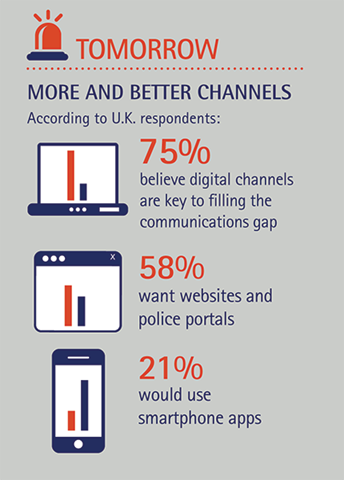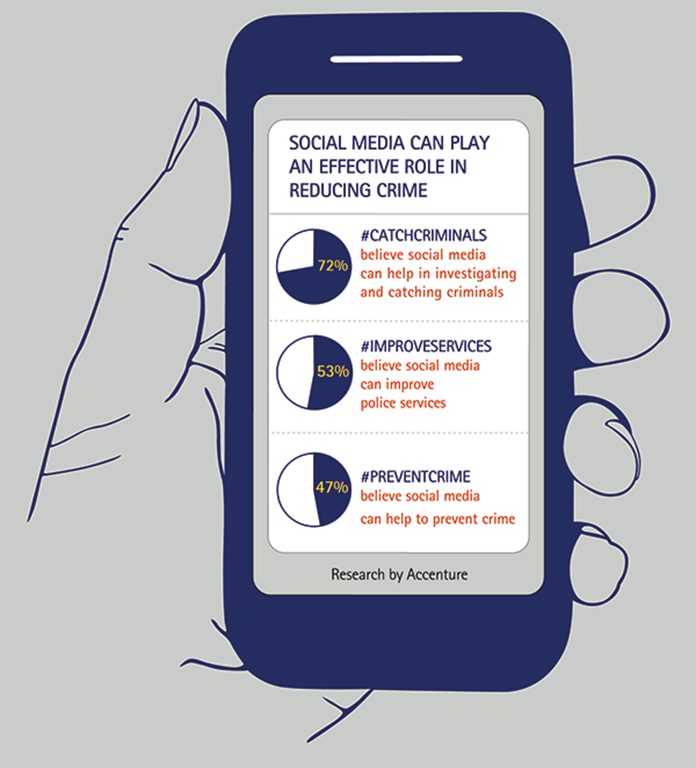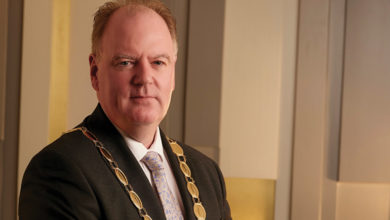Seizing citizen support

 Adopting new digital channels to capitalise on citizen support is vital to successful policing, writes Janice Edgar of Accenture.
Adopting new digital channels to capitalise on citizen support is vital to successful policing, writes Janice Edgar of Accenture.
For many reasons, public sector organisations must tread more carefully than their private counterparts when it comes to adopting new technologies and engaging in social media, but that doesn’t mean that the benefits of doing so are any less powerful.
Police forces and public safety agencies around the world are realising that using social media is the next step, not simply for online dialogue with citizens but as a means to facilitate rapid response and acquire better intelligence to support their investigations. From new analytic technologies which uncover and analyse communications patterns and online sentiment to wide-scale ‘word of mouth’ campaigns to share crime prevention or safety advice, social media is helping police to build trust with citizens and the communities they serve.
Many police forces across the world have already begun to embrace the advantages offered by digital media in the fight against crime. The Singapore Police Force launched an iPhone app to further the force’s citizen engagement efforts, allowing the public to check for the latest crime news, report incidents, and access information on police appeals and missing persons, as well as find location-based information such as the nearest police station, contact details and operating hours. On its first day, the app, which incorporates both facebook and twitter users, was downloaded more than 6,000 times making it the second most popular free application on the iTunes Singapore apps chart.
It should come as no great surprise to police forces the world over that citizens are supportive of their crime-fighting efforts and want to collaborate more, the evidence of which is detailed in a recent study commissioned by Accenture. The survey among nearly 1,300 citizens in six countries (the UK, Canada, Germany, USA, Spain and the Netherlands) reveals that almost all (92 per cent) want to support their police force in crime-fighting, with a keen 88 per cent of respondents believing they have an important role to play in reporting crime.
Such a high level of citizen support is good news, but to become a reality, communication must be a two-way street: a situation disputed by the majority of UK survey respondents (87 per cent) who feel only minimally informed of local police activities. So how can police forces bridge the existing communication gap and take advantage of this valuable citizen co-operation and support?
According to the Accenture findings,
75 per cent of citizens surveyed in the UK want to see police forces use more digital channels to engage with the public, viewing digital communications as essential to bridge the communication gap that exists. Only 19 per cent of respondents were aware of the use of any digital channel usage by their local police force.
Additionally, individuals are eager to maintain their privacy; 69 per cent of UK respondents said they would interact with police more if they had the option to remain anonymous when reporting a crime or providing police with information to support their investigations.
To meet the needs of digital citizens, police forces must make greater use of digital technologies and tools to enable citizen engagement in new ways, harnessing vital citizen support for their operations and investigations.
While 69 per cent of UK respondents identified social media as an effective tool to aid investigations and catch criminals, just 13 per cent said their local police force was currently using social media as a communications channel. Yet the benefits of social media usage are not lost on citizens. Almost half of respondents (46 per cent) believe that social media use by police can improve police services, with 41 per cent going further, saying that it can actually prevent crime. Those surveyed also expressed preferences for specific social media platforms, with 85 per cent of citizens saying they would most likely use facebook to interact with the police, while 39 per cent had a preference for twitter.
UK citizens also identified other digital channels they felt important and would like to see police adopt. Twenty-one per cent of respondents believe that police should make greater use of smartphone and mobile applications to communicate with citizens and over half (58 per cent) said they would like to see an increase in the use of dedicated police websites and portals to engage with the community. Only one quarter (25 per cent) of respondents were aware that their police force was currently using dedicated websites and portals.
Citizen respondents from across all countries surveyed said that their forces continue to rely heavily on traditional media channels including newspapers (69 per cent) and radio or television news reports (45 per cent) as their primary tools for one-way communication with citizens.
In with the new and hold what’s old
Survey respondents made it clear that they are not proposing an “out with the old, in with the new” approach. Indeed, respondents expressed a strong desire for new digital channels to run alongside and support traditional community policing activities. Not surprisingly, the majority (72 per cent) of UK respondents still prefer to report a crime over the telephone or in person to a police officer and more than half (61 per cent) said that “seeing police on the street” instils confidence in local policing efforts. In addition, more than half of those surveyed (52 per cent) say that they would like to have a designated community police force contact.
Overall, the survey findings show a strong desire by citizens in the UK and overseas not only to change the way they interact with the police but also to support their local force to deliver crime-fighting services in new ways. Citizens now want to receive and share information with police through their method of choice – a digital channel and, increasingly, a mobile one – and they are looking for ways to engage with police while reserving the option of anonymity.
Social media is part of our world and, some would argue, essential to our personal and professional lives. Private sector organisations would certainly agree; in recent years, few communications or customer engagement campaigns have been complete without a social media component. While the public sector must take a cautious approach to the way it uses and interacts with social media channels, the strong belief among citizens is that digital technologies can improve police services and prevent crime by facilitating information sharing between these two groups.
By carefully managing and analysing the information they receive from citizens – a pool of 75 million twitterers and 850 million facebook users worldwide police forces can gain valuable intelligence that helps to prevent crime, support investigations, secure prosecutions and, ultimately, create safer communities, online and offline.
Accenture Belfast
Belfast Business Centre
Cathedral House, 23-31 Waring Street
Belfast BT1 2DX
Northern Ireland
Contact: Janice Edgar
Janice.edgar@accenture.com








